SHAH ALAM: Still in Limbo. As the Royal Australian Navy (RAN) celebrated the commissioning of its biggest ship, HMAS Canberra today (Nov 28, 2014), its counterpart, the Royal Malaysian Navy could only watch in envy.
There is no way we can or should even try to match Oz militarily, anyways. As Australia is an integral part of Malaysia’s strategic outlook, such upgrade in capabilities is welcomed, albeit quietly lest it is misunderstood.
In the meantime, RMN’s two training ships, PCU’s Gagah Samudera and Teguh Samudera, remained in limbo as the shipyard, NGV Tech Sdn Bhd, has been foreclosed by Maybank. The delay in commissioning the DSME-designed 75-metre ships, probably caused RMN to continue operating the veteran frigate, KD Hang Tuah as a training ship.
Yesterday, by coincidence or not as the media were waiting at the Port Klang Cruise Centre (PKCC) for the arrival of two Korean Navy ships, the Gagah Samudera was towed out by tugs from its berth at the nearby RMN’s Hydrography Centre.
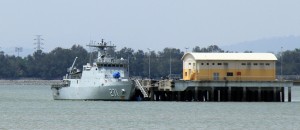
No explaination was given for the Gagah Samudera sojourn onto the busy Port Klang channel, under the control of three tugs. Perhaps it is the regular monthly shakedown of the training vessel or simply it was being prepared for a journey up north to a shipyard where the programme will be revived.
From the picture, we can see that the main radar mast is not installed as with the navigation radar. The two RHIBs aft remained on their respective stations however. As I had mentioned before a shipyard had been selected to complete and commission both ships, Gagah (Gallant and Teguh (Steadfast).
Hopefully, despite their travails, both vessels will lived up to their names. And more importantly, lets hope the ship’s equipment plug points and similar fittings had been carefully insulated so as to prevent any lasting damage to the delicate wiring.
Unlike Gagah, the last time I checked (early this year), Teguh Samudera remained berthed at the former NGV Tech shipyard in Sinjangkang, Banting. The ship will also be towed to the shipyard up north once the contract to complete and commission them is signed. Some of the equipment meant for both ships are still stored at the Sinjangkang yard under the guard of the RMN’s Provost police.
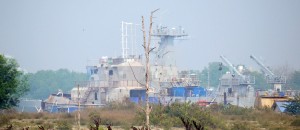
What does this got to do with HMAS Canberra’s commissioning? Nothing actually. It is just my way of saying that I do keep tabs on the international defence scene but since this Malaysian Defence, most of the time I do not highlight them.
– Malaysian Defence
If you like this post, buy me an espresso. Paypal Payment

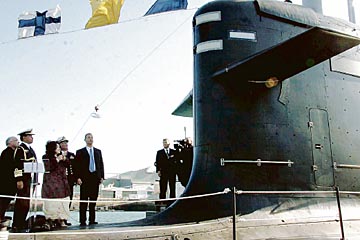
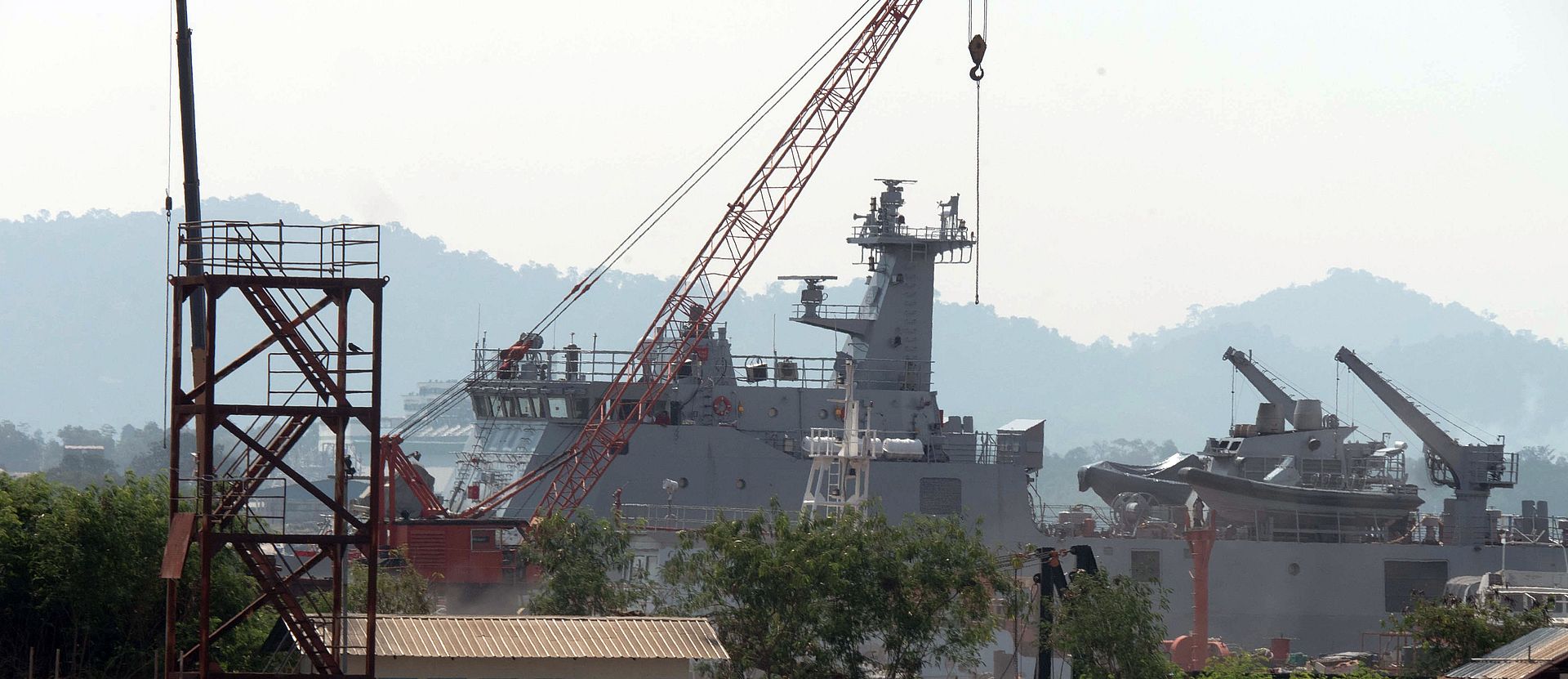
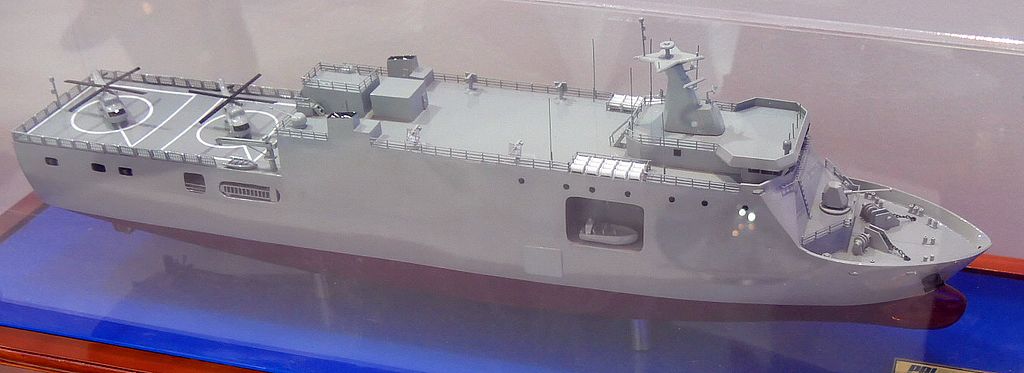
Azlan says:
December 5, 2014 at 3:11 pm
AM,
True but then it depends entirely on the circumstances. If only a single corvette was in the area, it would be tasked to remain there until it could be relieved. There might or might not be other assets that could rushed there at short notice, irrespective of how near the nearest base was.
My opinion is that having replenishment ships are mainly intended to support ROKN out of area operations [and I’m not including Dokdo]. I’m not saying I’m absolutely right; it’s just my opinion.
AM says:
December 5, 2014 at 4:17 am
“As for Dokdo, there have been standoffs there before. If a corvette that was already on station in the area and was diverted there – despite using up half its stores – this is where a replenishment ship would come in.”
If a corvette was ordered to rush to Dokdo (only 131nm from the nearest base) and had limited endurance left, the logical thing would be to send another hull to relieve it. Rather than keep an oiler ready to replenish it.
Dokdo alone would be small justification for an oiler compared to as all the other factors you and I have mentioned.
kerberosWXIV says:
December 4, 2014 at 8:44 am
With current oil prices, RMN’s LHD will truly be in indefinite limbo, just like the Flying Dutchman…
Azlan says:
December 2, 2014 at 3:52 pm
AM,
BTW, since we’re on the subject of South Korea, it might interest you to know that a delegation from the Defence College [including RMN officers] visited South Korea 3-4 months ago. They had talks with the ROKN, visited Pusan, were shown the wreck of the ROKS Cheonan and also visited Korea Aerospace Industries’s facilities.
A Naval Working Group established in 2001 by the RMN and ROKN
also meets regularly to discuss cooperation and regional issues.
Azlan says:
December 2, 2014 at 3:46 pm
AM,
Let me be more precise.
On paper, given the North Korean threat, geography, length of coastline and size of the EEZ, the ROKN would not need the fleet it has now, i.e. the large numbers of destroyers, frigates, corvettes, FACs and SSKs.
However, taking into account that the country might have a need for extended ops beyond its shores [in the Pacific against China or further afield to protect South Korean shipping or the country’s sea lanes], they have seen a need for a replenishment fleet. And as much as you dismiss it, national pride also has a place to play, especially given the traditional rivalry with Japan and South Korea’s previous quest to be a 1st World nation and to be recognised as one. And of course there is always China looming over everything.
As for Dokdo, there have been standoffs there before. If a corvette that was already on station in the area and was diverted there – despite using up half its stores – this is where a replenishment ship would come in.
AM says:
December 1, 2014 at 11:43 pm
I see you were referring to the force structure of the ROKN as excessive for facing NK, and to the oilers as potentially excessive for supporting the Sejong’s BMD mission. Our positions are clear.
But I have to ask you why considering what I’ve said about keeping the BMD ships supplied while waiting for war to start, the length of the war, the likelihood of their ports being attacked and the desirability of not leaving station in all the above.
Why do you consider these less important than your alternative:
“I believe ROKN replenishment ships are mostly intended to support ROKN ships in case they find themselves operating ”away” for period in places such as Tshima island [Dokdo]”
This itself seems to contradict your earlier statement. Dokdo being only 131 nautical miles or half a day’s sailing from the nearest naval base.
“On paper, the ROKN does not have a need for several replenishment ships, given that their EEZ is smaller than ours and that there is no part of South Korea, detached from the Korean
peninsular, that requires 2/3days or more sailing time to get to.”
Azlan says:
December 1, 2014 at 8:34 pm
”I’ve said almost all I have on the Sejongs.”
Firstly, there is a profound difference between SSKs and destroyers [in terms of roles] AND I did NOT say the Sejong was in excess of the country’s needs.
What I did say was that the ROKN’s force structure – as a whole – would appear to be in excess of its needs; given that the main concern is North Korea and that one does not need large numbers of destroyers and frigates to project power into North Korea or to defend itself against North Korea; given the distances involved, geography and the state of the North Korean navy. The ROKN’s force structure clearly demonstrates that the country threats perceptions also lie elsewhere and that they see a possible future need for deployments beyond South Korean national waters or the country’s backyard.
AM says:
December 1, 2014 at 4:56 pm
“The point I was really tying to make is that the Sejongs won’t have to operate too far north for ABM taskings; thus, especially given their range and endurance, might not have a need for replenishment at sea”
Doesn’t this miss the point that without replenishment at sea, a Sejong still has to leave its BMD station for replenishment? A Korean war is going to be a long slog, and there are only 3 Sejongs to cover both Korean coasts.
I’ve said almost all I have on the Sejongs. Maybe you can help me with their fleet of SSKs which will peak at 18 boats. I don’t think these are for national pride, showing the flag around Dokdo, joining a US task force or fighting NK’s tiny navy. Would you describe them as “excess to needs” or necessary to deter the PLAN in the event of a regional war that involves China? Now, if these boats are not excess to needs, then why the Sejongs?
Azlan says:
December 1, 2014 at 3:07 pm
”As I said, the Cheonji class is relatively young and is slated to be replaced shortly by larger ships, specifically fast combat support ships with combat stores capacity. After all, the Cheonjis pre-date the Sejongs and their new capability by some years.”
The point I was really tying to make is that the Sejongs won’t have to operate too far north for ABM taskings; thus, especially given their range and endurance, might not have a need for replenishment at sea :]
”It is accepted that Japan will have their armed forces shaped differently because Korea must give priority to land power.”
South Korea as you’re aware has a longstanding dispute over Dokdo and there has been sabre ratlling there in the past by both sides. Despite the priority being on land, Seoul has gone to great lenghts to develop a navy that is in excess to its needs, given the lenght of the coastline, the size of the EEZ and the actual threat posed by North Korea – yes it has a need for a seaborne ABM capability but it doesn’t need what it currently has to deal with the North Koreans. We can safely assume that part of the reason may be for national pride and to show that not only Japan has a ”1st world” military. Another reason to develop a navy with a ”longer” reach” is to be able to operate as part of any US led task force in case of a conflict that threatens South Korea’s national interest.
AM says:
November 30, 2014 at 11:23 pm
“Also, given the threat posed by mines and coastal defences, it is unlikely that the ROKN would want to risk such a high capital asset deep inside North Korean waters.”
Well, one may be operating outside NK waters but still be a great distance from home waters and ports.
Another practical reason for replenishment ships is that ports will be targeted by NK missiles, rather than symbolically keeping up with Japan. It is accepted that Japan will have their armed forces shaped differently because Korea must give priority to land power.
“In a prolonged conflict they would probably run out of missiles before they ran out of fuel.”
As I said, the Cheonji class is relatively young and is slated to be replaced shortly by larger ships, specifically fast combat support ships with combat stores capacity. After all, the Cheonjis pre-date the Sejongs and their new capability by some years.
Azlan says:
November 30, 2014 at 5:32 pm
AM – ”On the contrary, I believe there is great reason for the Sejongs to perform BMD missions and cruise missile strikes on NK.”
I didn’t say otherwise. What I meant was that to intercept North Korean missiles, the Sejongs might not have to operate deep inside North Korean waters. Off course the whole idea is to detect, track and intercept the missiles as soon as they’re launch but given the width of the South Korean peninsular and the location of likely targets, the Sejongs probably can do the job whilst in South Korean waters. Also, given the threat posed by mines and coastal defences, it is unlikely that the ROKN would want to risk such a high capital asset deep inside North Korean waters.
Another reason why the ROKN would want replenishments ships, apart to support the odd long range deployment and the possibility of its ships being stationed for extended periods; might be due to national prestige: to show that South Korea is also a 1st ”World nation” with a ”1st world” military, on par with it traditional rival [which it has a longstanding dispute with] Japan.
”It is easy for me to see these ships and accompanying vessels taking up BMD and strike stations in anticipation of war’s outbreak, which makes the Cheonji class a necessity. ”
Given the size of these vessels and the size of their fuel tanks, in a prolonged conflict they would probably run out of missiles before they ran out of fuel.
AM says:
November 30, 2014 at 2:17 pm
On the contrary, I believe there is great reason for the Sejongs to perform BMD missions and cruise missile strikes on NK.
In a second Korean war, launching US style deep cruise missile strikes will reduce the need for a very busy ROKAF to strike great distances into heavily defended NK air space.
There is also an absolute political necessity to mount every defence of the homeland against ballistic missiles, potentially with chemical and biological warheads.
The Korean’s chosen VLS load reflects these priorities: 80 SM-2, 32 cruise missiles and 16 ASROC. Apart from the Kirovs, this is the largest VLS battery of any ship in the world and adds substantially to the cost and displacement of the ship. I don’t think the ROKN did it merely to outdo Japan.
It is easy for me to see these ships and accompanying vessels taking up BMD and strike stations in anticipation of war’s outbreak, which makes the Cheonji class a necessity.
Btw, the ROKN plans to replace the 3 relatively young Cheonjis (commissioned 1x 1992 and 2x 1998) with larger replenishment ships starting 2017.
Azlan says:
November 30, 2014 at 2:33 am
AM – ”Is it practical to save money and put our trainees aboard a standard OPV on operational patrols?”
It makes sense to train midshipmen and other ranks on a decent sized vessel [with certain endurance and range and systems such as a surface search and navigation suite], which would look silly armed with anything smaller than a 20 or 30mm auto-cannon :] Also, given that the Lekius are armed with a MSI 30mm [an earlier version] and that the LCS will have 2 each, it makes sense to train the other ranks on it. I would be surprised if – as part of the training – the ships do not conduct operational patrols, like Hang Tuah does.
BTW, an acquaintance was selected to command one of the training ships ships but delays in their delivery resulted in him being sent elsewhere.
”What’s the worst that could happen- running into a bandit sampan?”
Coming across a ”bandit sampan” that has a shoulder launched weapon on board or a foreign fishing trawler of almost similar displacement that tries to ram [it has happened before] for which 7.62mm might not have the desired effect ……
Azlan says:
November 30, 2014 at 1:55 am
AM,
I believe ROKN replenishment ships are mostly intended to support ROKN ships in case they find themselves operating ”away” for period in places such as Tshima island [Dokdo] or in the event the ROKN has to operate as part a multi-national force in the Pacific. To a certain extent ROKN replenishment ships will also be used to support other ships up ”north” but I don’t think the Sejongs would operate deep inside North Korean waters to intercept ballistc missiles.
Still, given the lenght of its coastline and size of it’s EEZ, on paper the ROKN would have little need for an oiler; which might explain why it doesn’t have a few in service.
… says:
November 29, 2014 at 11:51 pm
@ azlan
RTN uses their oilers to escort their ships, particularly those small patrol vessels and FAC’s to go round past singapore in order to transfer from the gulf of siam to the andaman sea without needing to stop at any other countries on the way to refuel. Thats why they have a few of them. Tldm/mmea ships on the other hand can always stop at a malaysian port that is within range during transfers from East to west malaysia.
RedSot says:
November 29, 2014 at 11:13 pm
yes encik am,its good to have an operational ship cum tranning vessel,this might save money for the cash strap tldm.
Correct me if I’m wrong,torpedoes that is currentlyin service are not the yesteryears topedoes dedicated to kill sub but these torpedoes are also use to sink surfaces vessels be it wire or optical cable link…..I’m not a mariner but there ar such topedoes or is it just my out loud thought…..hehe
AM says:
November 29, 2014 at 7:04 pm
Azlan,
The Cheonjis will be useful for when the ROKN operates for sustained periods off the very long NK coasts. When their 3 new Aegis destroyers get into cruise missile launching and perform their BMD missions, the oilers will be all the more important.
Azlan says:
November 29, 2014 at 5:31 pm
AM,
Depends entirely on how often they do out of area deployments and how often ROKN ships will be required to stay on station for prolonged periods in home waters, doesn’t it?
On paper, the ROKN does not have a need for several replenishment ships, given that their EEZ is smaller than ours and that there is no part of South Korea, detached from the Korean
peninsular, that requires 2/3days or more sailing time to get to. For the same reason, I could never understand why the RTN has need for an oiler.
AM says:
November 29, 2014 at 4:32 pm
These ships are practically the same as our OPV. Is it practical to save money and put our trainees aboard a standard OPV on operational patrols?
We are not in a war zone. What’s the worst that could happen- running into a bandit sampan?
Reply
Yes there were talk that it will be used in operational patrols hence the 30mm gun. As the number of hulls is low, it is expected.
AM says:
November 29, 2014 at 4:23 pm
I made a mistake. There are 3 ships in the Cheonji class but they are probably the busiest ships in the ROKN.
RedSot says:
November 29, 2014 at 2:02 pm
these training ship is a handsome ship,if only it is fitted with super rapid plus torpedo launcher it can be patrol vessel cum training ship,to bad it is not fully operated on auto,because not only it utilises small number of man power but it can as well carries more trainee and boarding party as and when necessary.expose these trainee to real situations it will be a priceless exprience……just thinking out loud
Reply
The proposed 30mm gun is better for patrol while the torpedo launcher need an ASW sonar for it to be useful. Anyways where the ship is expected to serve, no submarine will dare venture into
AM says:
November 29, 2014 at 11:06 am
As their only replenishment ship, tough for the Cheonji to ever get a break.
Reply
Even the most of well endowed also find its tough to justify non-combat assets although everyone knows the importance of such vessels
puzzle says:
November 28, 2014 at 11:56 pm
Disgusting. Luckily both ship do exist.
… says:
November 28, 2014 at 7:38 pm
BTW
Could you share the names of the korean navy ships that visited port klang?
Reply
They are the destroyer, ROKS Choi Yong and combat support ship. ROKS Cheonji. Both ships are part of the the Korean navy’s Cruise Training Task Group.